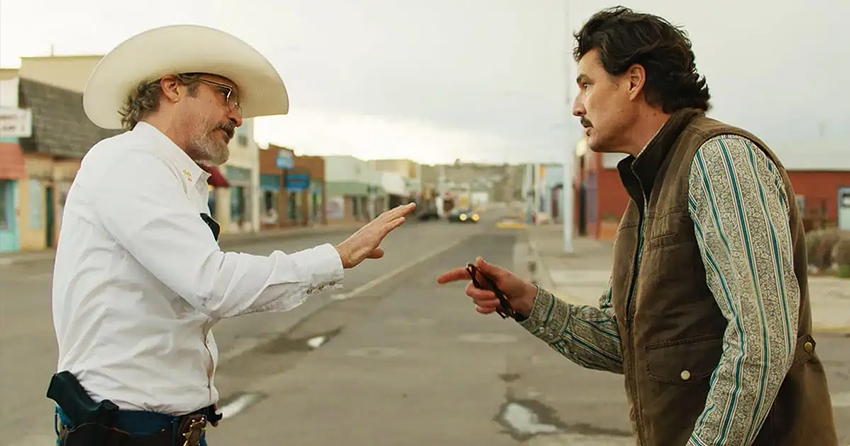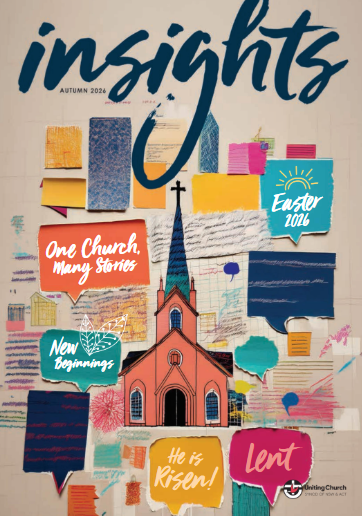Film review: Eddington
2020 – the first year of COVID lockdowns, social distancing, and global masking – was five years ago now, but the pandemic has altered many people’s sense of time in such a way that it feels much more recent. COVID-19, of course, never really went away, but enough time has passed that a film about 2020 has some opportunity to shine a light on a difficult period with some hindsight. Indeed, the tagline for Eddington is “hindsight is 2020” – and while this probably isn’t the definitive film about the rise of the coronavirus, it’s as weird and challenging as that year deserves.
Eddington is set in a small town in New Mexico, population 2500-ish, in May 2020. At the film’s opening, Sheriff Joe Cross (Joaquin Phoenix giving one of his most mumbly performances) and mayor Ted Garcia (Pedro Pascal) are clashing over mask mandates – Ted has instigated them in accordance with the governor’s orders, but Joe refuses to wear one, claiming his asthma plays up – and besides, there are no cases in Eddington yet. Joe, of course, is actually just angry at the mayor, ostensibly over a perceived wrong he committed against Joe’s wife, Louise (Emma Stone), years earlier. On a whim, Joe decides to run for mayor himself, pulling his deputies into his campaign to smear Ted. Meanwhile, Louise and her Internet-poisoned mother (Deidre O’Connell) become fixated on a smooth-talking online conspiracy theorist, Vernon Peak (Austin Butler). Naturally – as was the case in 2020 – everything escalates.
Director Ari Aster is best known for his work in horror (Hereditary, Midsommar), but his brilliant 2023 nightmare Beau is Afraid suggested that his real strength is in depicting, examining and interrogating anxiety. Eddington is a look back at a time when anxiety and pain reigned supreme, albeit from a particularly American perspective; Trump is never evoked directly, but his shadow hangs over the movie. As things boil over in the town of Eddington – between the mask mandates, the tensions between the opposing mayoral candidates, and the protests that erupt across town in the wake of George Floyd’s death – we know, from having lived through the last decade, that there will be no scenes where people sit, break bread, and come to understand each other’s perspectives.
The underlying ideology of Eddington is difficult to pin down – some have accused the film of taking a centrist position, but I don’t think that’s quite it. It’s a film where characters are constantly filming themselves and each other, posting their every move to Instagram, and it would be easy to chalk it up as a movie about the distinction between online performance and reality. But there’s more going on than that, too. The movie presents the lives of these characters, their personal beliefs and interests, and shows how they mediate their sense of self against a variety of external pressures and influences. Who are they, but also, who are they meant to be in a world that feels like it’s collapsing? What is the distinction between the values they present and the values they hold, and which is more important?
The more I consider Eddington, the thornier it all seems. There are elements of the plot that butt up against your ability to have a definitive “read” of the film, and its final act is somewhat inelegant, introducing too many new threads and characters. Perhaps this was all part of Ari Aster’s grand plan, though – trying to talk about this movie evokes a familiar sense of anxiety, a feeling that there are right and wrong responses to it, just as the characters in the film struggle to say what they mean or mean what they say.

As one of the first real “hindsight” films about 2020, Eddington successfully delves into a complicated year, and suggests that enough time has passed to really examine what was happening to us all back then with some degree of nuance. It’s also – as is often the case with Aster – funny in a complicated way, where you might laugh at something and then quickly glance around the cinema to make sure other people are laughing, too. The discomfort and ambiguity may be too much for some, but Eddington rewards any viewer willing to sit in that discomfort and think about what it means to them.
Eddington is in cinemas now.






